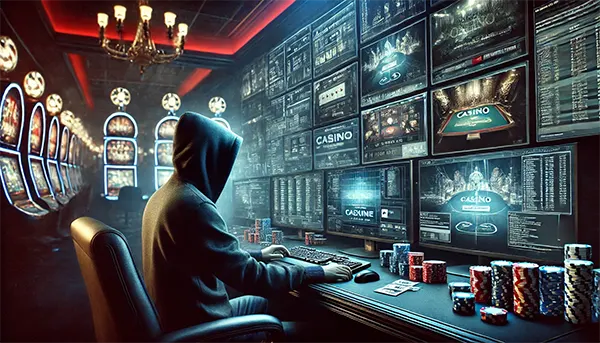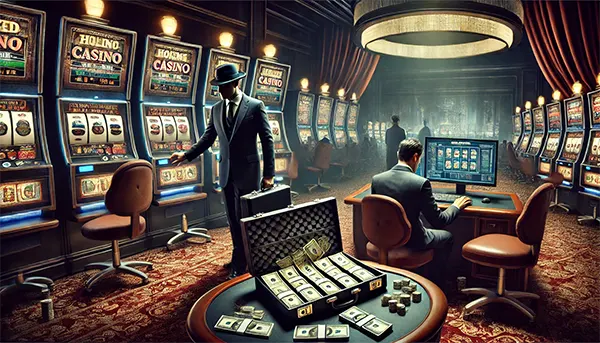
Black marketing in the online casino industry is a growing concern. Unscrupulous operators use unethical tactics to harm competitors and gain an unfair advantage. From fake reviews to cyber-attacks, the gambling sector is no stranger to aggressive business practices. This article delves into the underhanded techniques employed by dishonest casinos and how players and legitimate businesses can protect themselves.
Fake Reviews and Misinformation Campaigns
One of the most common tactics in black marketing is spreading fake reviews and misinformation. Dishonest casinos create negative reviews about competitors, damaging their reputation and misleading potential players. These reviews appear on forums, social media, and even trusted review platforms, making them difficult to identify as fraudulent.
Some rogue operators also manipulate positive reviews for their own casinos. They hire fake reviewers to flood the internet with glowing testimonials that paint an unrealistic picture of their services. This leads to false trust among players, who may only realise the deception after experiencing poor service or delayed withdrawals.
Misinformation campaigns can also involve spreading false claims about a competitor’s license status, financial stability, or security measures. These tactics create doubt among players and encourage them to switch to less reputable platforms.
How Players Can Identify Fake Reviews
Players should be cautious when reading online casino reviews. If a review is overly positive without mentioning any drawbacks, it may be fake. Likewise, overly aggressive negative reviews that lack specific details about real experiences should be taken with scepticism.
Checking multiple sources is key. Reputable casino review sites that base their ratings on verifiable data provide a more accurate picture of a casino’s reputation. Players can also look for user-generated content on independent forums rather than relying solely on official review platforms.
Another effective method is to verify if a casino is licensed by recognised gambling authorities. If an operator claims a competitor lacks a license but offers no proof, it may be part of a smear campaign.
Cyber-Attacks Against Competitors
In addition to misinformation, some unethical casino operators employ cyber-attacks to disrupt their rivals. These attacks can take various forms, including Distributed Denial-of-Service (DDoS) attacks, hacking attempts, and phishing scams targeting competitor sites.
DDoS attacks are particularly harmful, as they overwhelm a casino’s servers with traffic, making the website slow or entirely inaccessible. This leads to financial losses for the targeted business and creates frustration among players, forcing them to seek alternatives.
Hacking attempts are also common. Cybercriminals hired by unethical operators may attempt to steal customer data or manipulate the competitor’s gaming software to create unfair conditions. The damage from such attacks can take months or even years to recover from.
How Casinos Can Defend Against Cyber-Attacks
Legitimate casinos must invest in strong cybersecurity measures to protect against attacks. This includes using advanced firewalls, DDoS protection services, and encryption protocols to safeguard player data.
Regular security audits can help identify potential vulnerabilities before they are exploited. Casinos should also educate their staff on phishing attacks to prevent security breaches caused by human error.
Working with legal authorities and gambling regulators can also deter cybercriminals. Reporting attacks and cooperating with investigations ensures that perpetrators face consequences for their actions.

Social Media Manipulation and Blackmail
Social media is a powerful tool in the online casino industry, but it is also a common battleground for black marketing. Dishonest operators create fake social media accounts to spread negative narratives about competitors, often fabricating complaints and scandals.
Some go as far as blackmailing influencers or paying them to post misleading content. Influencers with large followings can significantly impact a casino’s reputation, making them prime targets for manipulation.
In extreme cases, unethical casinos may even create fake complaints with regulatory bodies to trigger investigations against their competitors. Even if these claims are unfounded, they can cause reputational damage and financial strain on the targeted operator.
Protecting Casinos from Social Media Attacks
Casinos should closely monitor social media for signs of black marketing. Setting up alerts for brand mentions and regularly engaging with players can help spot and address misinformation before it spreads.
Collaborating with genuine influencers who have a reputation for transparency can also help build trust. Players are more likely to trust recommendations from influencers with a track record of honesty rather than those who suddenly switch opinions.
Legal action is another option. If a competitor is engaging in defamatory practices, pursuing legal recourse can help put an end to the misinformation campaign and set a precedent against such unethical behaviour.
